语言中的性别歧视极其社会原因
从语言学角度分析中西语言性别歧视现象

从语言学角度分析中西语言性别歧视现象性别歧视不仅存在于社会,同样存在于语言的各个方面。
语言是社会的真实反映,社会的观念也影响着语言。
本文通过通过中西方语言中称谓、词汇、词义三个方面分析性别歧视反映社会对女性的偏见。
标签:性别歧视;语言称谓;弱势群体语言好比一面镜子,通过语言可以反映社会的各种活动。
社会和语言有着密不可分的关系,社会给语言提供了情景让我们真实地感受语言每个方面并且社会的观念和价值观影响着语言,语言反映一个社会的观念和价值观。
自古以来,中西方两国在多方面都存在着性别歧视的现象,并且也在语言中有所体现。
在语言习惯上,“性别歧视”通常是指语言对女性的歧视,在语言中主要表现在称谓、词汇、词义上。
一、称谓方面上的性别歧视现象首先表现在姓名称谓,在中西方语言文化中,女性社会地位低下,往往被视为男性的附属或变体。
在中国古代女性一般是没有什么名字的,只有出身高贵的女性才有正式的名字。
女性的姓名往往在结婚后只保留名,而姓则随丈夫姓,例如“王氏”或者“李氏”等。
在西方,女性婚前一般用父姓,婚后改用丈夫的姓。
妇随夫姓甚至被写入法律,即便是男方过世,女方姓名中仍然要保留夫姓。
其次表现在社会称谓上,虽然中国曾存在过母系社会并且达到的繁荣昌盛的地步,但随着社会生产力的发展和男性在生产部门的地位日益突出,父系社会逐渐取代母系社会并一直延续下去。
中国男性统称为“先生”,而中国女性分为“小姐”和“某太太”两种称谓,前者用于未婚女性且随父姓,后者用于已婚女性且随夫姓。
这一点在西方也有明显体现,男性称为Mr.,女性同样分为两种称谓,一是Miss,用于未婚女性且随父姓,二是Mrs.,用于已婚女性且随夫姓。
从先生和Mr.上看不出男性的婚姻状态,但对于未婚女性和已婚女性却有着不同的称谓。
这说明,女性结婚前后都是男性的一种附属品,不具有独立的社会身份。
性别歧视还表现在社会职业名称上,一方面,像doctor,professor,lawyer等社会地位较高的职业通常与男性联系在一起,如果女性担任该职务,往往要加上woman,female 等词特指女性,例如,woman doctor,female surgeon等。
英语语言性别歧视现象及其文化内涵

英语语言性别歧视现象及其文化内涵性别歧视是指一种基于性别的不公平待遇或偏见,这种现象在世界各地都存在,也在英语语言中有所体现。
英语语言中的性别歧视主要体现在以下几个方面:1. 代词使用:在英语中,有一些代词是具有性别的,如he(他)和she(她),这种用法暗示了男性在某些场合或属性上的优越性,而女性则处于从属地位。
这种语言上的区分反映了社会中对男性和女性角色的认知和期待。
3. 夸张的男性标准:在英语语言中,一些词汇和短语经常用来描述男性特质,如strong(强壮的)、brave(勇敢的)、tough(坚强的)等。
这些词汇传递出一种对于男性刻板形象的期待,同时也暗示了女性在这些特质上的不足。
这些性别歧视现象的存在反映了英语语言所承载的文化内涵。
在英语语言中,男性通常被认为有更高的社会地位和更多的权力,而女性则处于从属地位。
这种文化内涵凸显出男性主导和女性从属的性别角色定位,使得性别歧视现象在英语语言中得以存在和流传。
越来越多的人意识到性别歧视的存在对社会造成的负面影响,并且开始努力消除这种现象。
在英语语言中,也出现了一些反性别歧视的倡议和变革。
有些人开始使用gender-neutral(中性)代词,如they(他们)替代he或she,以求达到性别中立的表达。
也有人提倡使用gender-inclusive(包容性别)的职位称谓,如actor代替actor和actress,以避免性别差异。
英语语言中存在的性别歧视现象反映了该语言所蕴含的文化内涵,同时也需要我们的关注和反思。
通过倡导性别平等和消除歧视,我们可以推动社会的进步和公正,使每个人都能够受到平等对待和尊重。
试述英语语言中的性别歧视现象

试述英语语言中的性别歧视现象
英语作为世界上最流行的语言之一,也存在着性别歧视现象。
这种歧视在英语中表现
出来的形式多种多样,涉及到语言的用法、发音、文化传统等方面。
首先,英语中的性别歧视表现在语言用法上。
例如,男性职业往往被用于普通的代词
和名词,而女性职业则通常需要添加一个附加词来强调性别。
例如,“男”医生通常被简
称为“医生”,而“女”医生则几乎总是要被称为“女医生”,这种方式给人造成了一种
男性地位高于女性的感觉。
其次,在英语的发音上,也存在性别歧视现象。
例如,由于英语中很多单词和短语含
有“he”或“she”的音素,因此听到相应的词汇时,人们往往会自然而然地与相应的性
别联系起来,并且这种联系体现在听到这些词汇的发音上。
这种现象可能会使得某些女性
在英语语言环境中感到不被尊重或排挤。
此外,英语中的文化传统也会导致性别歧视的现象。
例如,在英语文学、广告、媒体
等方面,男性往往被描绘成活跃、自信、强壮、有责任心的形象,而女性则被描绘为柔弱、依赖、感性和家庭主妇的形象。
这种文化传播对于英语语言中产生性别差异和歧视问题起
到了很大的影响。
总的来说,在英语中存在着性别歧视现象,而这种现象并不能轻易地被消除。
我们需
要进行更深入的研究和教育,以让人们认识到性别歧视的重要性,并努力通过教育和文化
的手段来消除这种歧视。
只有在这样的努力下,英语这样一种世界性的语言才会逐渐拥有
更加平等和包容的语言环境。
汉语中的性别歧视
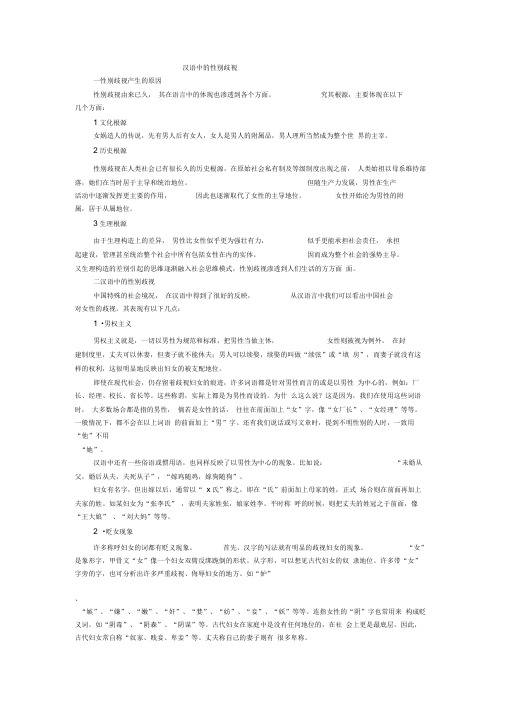
汉语中的性别歧视一性别歧视产生的原因性别歧视由来已久,其在语言中的体现也渗透到各个方面。
究其根源,主要体现在以下几个方面:1文化根源女娲造人的传说,先有男人后有女人,女人是男人的附属品,男人理所当然成为整个世界的主宰。
2历史根源性别歧视在人类社会已有很长久的历史根源。
在原始社会私有制及等级制度出现之前,人类始祖以母系维持部落,她们在当时居于主导和统治地位。
但随生产力发展,男性在生产活动中逐渐发挥更主要的作用,因此也逐渐取代了女性的主导地位。
女性开始沦为男性的附属,居于从属地位。
3生理根源由于生理构造上的差异,男性比女性似乎更为强壮有力,似乎更能承担社会责任,承担起建设,管理甚至统治整个社会中所有包括女性在内的实体。
因而成为整个社会的强势主导。
又生理构造的差别引起的思维逐渐融入社会思维模式,性别歧视渗透到人们生活的方方面面。
二汉语中的性别歧视中国特殊的社会境况,在汉语中得到了很好的反映,从汉语言中我们可以看出中国社会对女性的歧视。
其表现有以下几点:1 •男权主义男权主义就是,一切以男性为规范和标准,把男性当做主体,女性则被视为例外。
在封建制度里,丈夫可以休妻,但妻子就不能休夫;男人可以续娶,续娶的叫做“续弦”或“填房”,而妻子就没有这样的权利,这很明显地反映出妇女的被支配地位。
即使在现代社会,仍存留着歧视妇女的痕迹,许多词语都是针对男性而言的或是以男性为中心的,例如:厂长、经理、校长、省长等。
这些称谓,实际上都是为男性而设的。
为什么这么说?这是因为,我们在使用这些词语时,大多数场合都是指的男性,倘若是女性的话,往往在前面加上“女”字,像“女厂长”、“女经理”等等。
一般情况下,都不会在以上词语的前面加上“男”字。
还有我们说话或写文章时,提到不明性别的人时,一致用“他”不用“她”。
汉语中还有一些俗语或惯用语,也同样反映了以男性为中心的现象。
比如说:“未婚从父,婚后从夫,夫死从子”,“嫁鸡随鸡,嫁狗随狗”。
语言中的性别歧视及其社会文化内涵
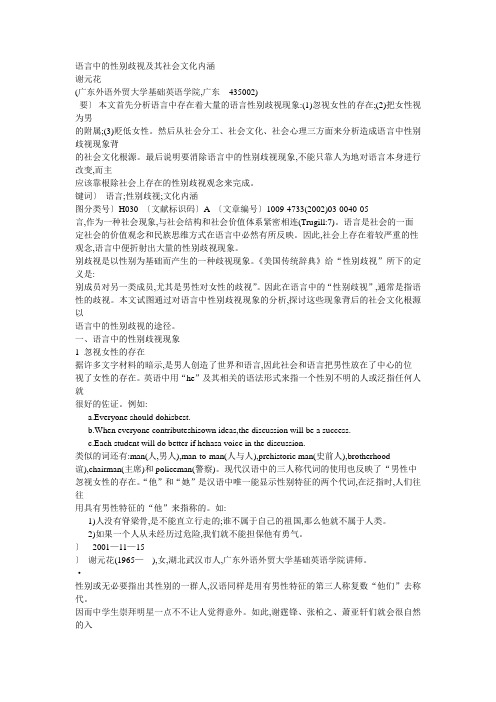
语言中的性别歧视及其社会文化内涵谢元花(广东外语外贸大学基础英语学院,广东435002)要〕本文首先分析语言中存在着大量的语言性别歧视现象:(1)忽视女性的存在;(2)把女性视为男的附属;(3)贬低女性。
然后从社会分工、社会文化、社会心理三方面来分析造成语言中性别歧视现象背的社会文化根源。
最后说明要消除语言中的性别歧视现象,不能只靠人为地对语言本身进行改变,而主应该靠根除社会上存在的性别歧视观念来完成。
键词〕语言;性别歧视;文化内涵图分类号〕H030 〔文献标识码〕A 〔文章编号〕1009-4733(2002)03-0040-05言,作为一种社会现象,与社会结构和社会价值体系紧密相连(Trugill:7)。
语言是社会的一面定社会的价值观念和民族思维方式在语言中必然有所反映。
因此,社会上存在着较严重的性观念,语言中便折射出大量的性别歧视现象。
别歧视是以性别为基础而产生的一种歧视现象。
《美国传统辞典》给“性别歧视”所下的定义是:别成员对另一类成员,尤其是男性对女性的歧视”。
因此在语言中的“性别歧视”,通常是指语性的歧视。
本文试图通过对语言中性别歧视现象的分析,探讨这些现象背后的社会文化根源以语言中的性别歧视的途径。
一、语言中的性别歧视现象1 忽视女性的存在据许多文字材料的暗示,是男人创造了世界和语言,因此社会和语言把男性放在了中心的位视了女性的存在。
英语中用“he”及其相关的语法形式来指一个性别不明的人或泛指任何人就很好的佐证。
例如:a.Everyone should dohisbest.b.When everyone contributeshisown ideas,the discussion will be a success.c.Each student will do better if hehasa voice in the discussion.类似的词还有:man(人,男人),man-to-man(人与人),prehistoric man(史前人),brotherhood谊),chairman(主席)和policeman(警察)。
浅析英语语言中的性别歧视现象
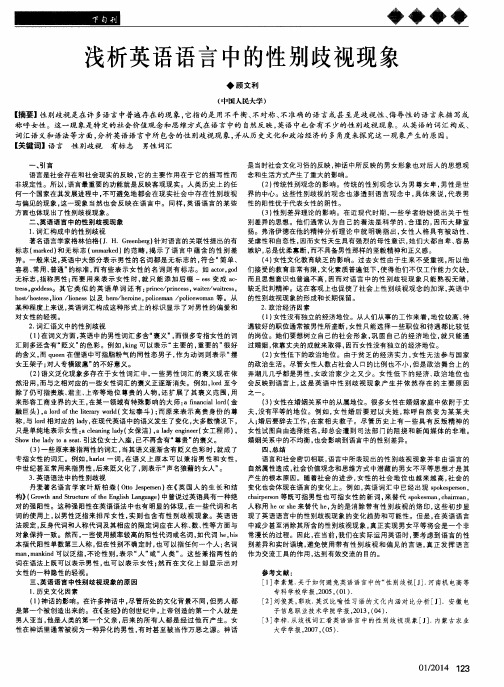
、
Байду номын сангаас
引言
语言是社会存在和社会现实 的反映 。 它 的主要作用在于 它的描写 性而 非规 定 性 。所 以 。 语 言 最 重 要 的功 能 就 是 反 映 客 观 现 实 。人 类 历 史 上 的 任 何一个 国家在 其发展进程 中。 不可避免地都会 在现实社会 中存在性别歧 视 与偏见 的现 象。 这一现象 当然也会 反映在 语言 中。同样 , 英语语 言的某 些 方面也体现 出了性 别歧视现 象。 二、 英 语 语 言 中 的性 别 歧 视 现 象 1 . 词 汇 构 成 中 的性 别 歧 视 著名语 言学家格林伯格 ( J .H.G r e e n b e r g ) 针对语言的关联性提出的有 标志( ma r k e d ) 和 无标志 ( u n m a r k e d) 的范畴 , 揭示 了语言 中蕴 含 的性别 差 异。一般来说 . 英语 中大部分 表示 男性的名词 都是无 标志 的。 符合 “ 简单 、 容易、 常用、 普通” 的标准 , 而有些 表示女性 的名词 则有 标志。如 a c t o r . g o d 无标 志, 指 称男性; 而要 用来 表示女 性 时, 就 只能 添 加后缀 一e s s变成 a c — t r e s s , g o d d e s s o其 它类似 的 英语 单 词 还 有: p r i n c e / p r i n c e s s , w a i t e r / w a i t r e s s , h o s t / h o s t e s s , l i o n/ l i o n e s s以 及 h e r o / h e r o i n e , p o l i c e m a n/ p o l i c e w o m a n等 。 从 某种程度上来说 。 英语词 汇构成这种形 式上的标识显示 了对男性 的偏 爱和 对 女 性 的轻 视 。 2 . 词 汇语 义 中 的 性 别歧 视 ( 1 ) 在词义方面 , 英语 中的男性词汇多含“ 褒义” , 而很多专指女性的词 汇则多还含 有“ 贬义 ” 的色彩。例如 , k i n g可 以表示“ 主要 的 , 重要 的” 很好 的含 义 。 而q u e e n在俚语 中可指脂粉气 的同性恋男子 , 作 为动词则表 示“ 摆 女王架子 ; 对人专横跋 扈” 的不好意义。 ( 2 ) 语义泛化现象多存在 于女性词 汇 中. 一些 男性词 汇的褒义现 在依 然沿用, 而与之相 对应 的一些女 性词 汇的褒义正逐渐消失。例如 , l o r d至今 除了仍可指贵族、 君主、 上帝等地位 尊贵 的人物 . 还扩展 了其 褒义范 围 。 用 来形容工商业界的大王 , 在某一领域 有特殊 影响的大 师: a i f n a n c i a l l o r d ( 金 融巨头 ) , a l o r d o f t h e l i t e r a r y w o r l d ( 文坛 泰斗 ) ; 而原 来表示高 贵身份 的尊 称, 与l o r d相对应的 l a d y , 在现代英语 中的语义发 生了变化 。 大多数情况下 , 只是单纯地表示女性: a c l e ni a n g l a d y ( 女保洁 ) , a l a d y e n g i n e e r ( 女 工程 师) 。 S h o w t h e l a d y t o a s e a t . 引这位女士入座 , 已不再含有“ 尊贵” 的褒义 。 ( 3 ) 一些原来兼指两性的词汇 , 当其语义逐渐含有贬义色彩 时 , 就成 了 专指女性的词汇。例如 , h a r l o t 一词, 在语 义上 原本可 以兼指 男性 和女性 , 中世纪甚至常用来指男性 , 后来贬义化 了, 则表示 “ 声名狼藉的女人” 。 3 . 英语语法中的性别歧 视 丹麦著名语言 学家叶 斯柏 森 ( O t t o J e s p e r s e n ) 在《 英 国人 的 生长 和结 构》 ( G r o w t h a n d S t r u c t u r e o f t h e E n g l i s h L a n g u a g e ) 中曾说过英语具有一种绝 对的强阳性。这种强阳性在英语语 法中也有 明显 的体 现 。 在一些代词 和名 词的使用上 . 以男性泛指来排 斥女性 , 实则也 含有 性别歧视 现象 。英 语语 法规定 , 反身代词和人称代词 及其相 应的限定词应 在人称 、 数、 性 等方面与 对象保持一致。然而 , 一些使 用频率较 高的阳性代词或名词 , 如代词 h e , h i s 本指代阳性单数第三人称 , 但 在性别不确定 时, 也可 以指任何一个 人; 名词 m a n . m nk a i n d可以泛指 , 不论性别 , 表 示“ 人” 或“ 人 类” 。这些 兼指 两性的 词在语法上既可以表示男性 。 也可 以表示 女性 ; 然 而 在 文 化 上 却 显 示 出 对 女性的一种隐性的轻视。 三、 英 语 语 言 中 性 别 歧视 现 象 的原 因 1 . 历 史 文 化 因 素 ( 1 ) 神话 的影响 。在许 多神话 中, 尽管所处的文化背景不 同。 但男人都 是第一个被创造出来的。在《 圣经》 的创世纪 中, 上帝创造 的第 一个人就是 男人亚当 , 他是人类的第一个 父亲 。 后 来的所 有人都 是经过 他而 产生。女 性在神话里通常被视为一种异化的男性 , 有 时甚 至被 当作万恶 之源。神话
汉语中的性别歧视现象略论
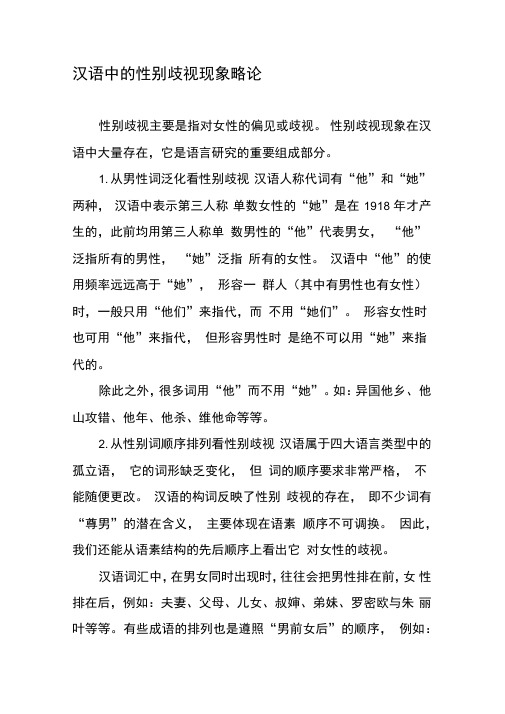
汉语中的性别歧视现象略论性别歧视主要是指对女性的偏见或歧视。
性别歧视现象在汉语中大量存在,它是语言研究的重要组成部分。
1. 从男性词泛化看性别歧视汉语人称代词有“他”和“她”两种,汉语中表示第三人称单数女性的“她”是在1918 年才产生的,此前均用第三人称单数男性的“他”代表男女,“他”泛指所有的男性,“她”泛指所有的女性。
汉语中“他”的使用频率远远高于“她”,形容一群人(其中有男性也有女性)时,一般只用“他们”来指代,而不用“她们”。
形容女性时也可用“他”来指代,但形容男性时是绝不可以用“她”来指代的。
除此之外,很多词用“他”而不用“她”。
如:异国他乡、他山攻错、他年、他杀、维他命等等。
2. 从性别词顺序排列看性别歧视汉语属于四大语言类型中的孤立语,它的词形缺乏变化,但词的顺序要求非常严格,不能随便更改。
汉语的构词反映了性别歧视的存在,即不少词有“尊男”的潜在含义,主要体现在语素顺序不可调换。
因此,我们还能从语素结构的先后顺序上看出它对女性的歧视。
汉语词汇中,在男女同时出现时,往往会把男性排在前,女性排在后,例如:夫妻、父母、儿女、叔婶、弟妹、罗密欧与朱丽叶等等。
有些成语的排列也是遵照“男前女后”的顺序,例如:郎才女貌、夫唱妇随、夫贵妻荣、男婚女嫁、男耕女织等等。
这种男先女后的语序原则也影响到与动物有关的语序排列,如“公母、鸳鸯、龙凤”等。
3. 从构词、语义看性别歧视3.1 构词、语义中的家庭角色汉语的男女称谓是不对等的。
汉语中有不少的谦称,其中不少是针对妇女的,体现了“夫为妻纲”的道德观,如对人可以称自己的妻子为“内人”“贱内”“糟糠”等,但是“丈夫”一词却没有相应的谦称形式。
从谦称中可以看出妇女在家庭中的地位。
所谓“内人”显然是限制了她们的活动范围,也就是说妻子的行动是不自由的,只限于家庭内部,所以才会有所谓的“家庭妇女”。
“贱内”则更加露骨地道出了妻子地位的低下。
3.2 构词、语义中的性别角色汉语词汇中有许多专门指代女性的,带有蔑视、戏谑或者贬斥的口气,如“红颜祸水”“黄脸婆”“母老虎”等等。
语言中的性别歧视现象分析
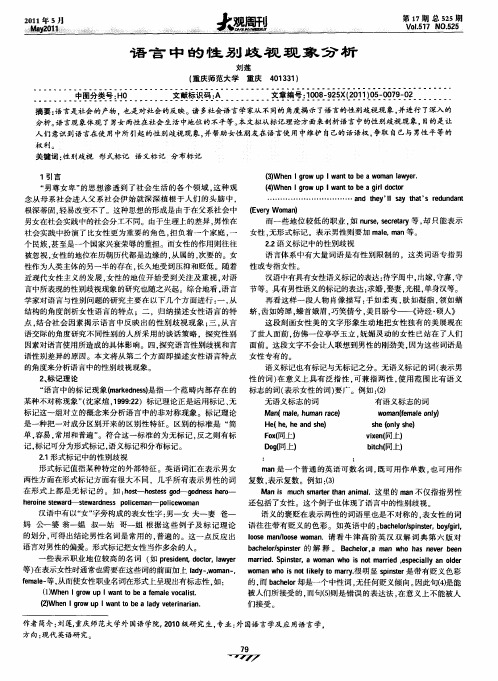
之类的职业 . 二句里则容易让人想到“ 在第 妓女”
23 .分布标记 中的性别歧 视
标记及分布标记从不 同的词汇 角度揭示了语言中的性别歧 视现
根 深 蒂 固 . 易改 变 不 了。这 种 思 想 的 形成 是 由 于在 父 系社 会 中 (vr Wo a) 轻 E ey m n 而一 些地位较低 的职业 , g i .ert 等 , 只能表示 如 us sce r e a y 却 男 女 在社 会 实 践 中 的社 会 分 工 不 同 。 由于 生 理 上 的差 异 , 性 在 男 无形式标记 。表示男性则要加 ma , n等 。 lm ea 社 会 实 践 中扮 演 了 比女 性 更 为重 要 的 角 色 , 负着 一 个 家庭 , 担 一 女性 .
被 人 们 所 接 受 的 , 句() 是 错 误 的 表 达 法 , 意 义 上 不 能 被 人 而 5则 在 们接受 。
作者简介 : 刘莲, 师范大学外国语 学院, 0 0 重庆 2 1 级研 究生, 专业: 外国语 言学及应用语言学。
方向 : 现代 英语 研 究 。
7 9
—
一
h r ie se a d se r n s p l e n - o i wo n e on tw r - twad e s o i ma - p l e ma c c
些表示职业地位较 高的名词 ( pei n, otr1 yr 如 rs etdco.a e d w
ma r d S i s r o n wh s n tma r d ,s e i l n od r ri . pn t .a w ma o i o ri e p ca l a le e e e y
( Tm hpst m e a l ils i tr 5 o oe et negb pn e. ) o i e s
英语语言中的性别歧视及其消除

英语语言中的性别歧视及其消除英语语言中的性别歧视及其消除【中文摘要】语言是社会的一面镜子,它能折射出社会对女性的种种歧视;语言的内涵有时是带有歧视性的,主要表现在语言在很大程度上存在诋毁女性、贬低女性,并将女性置于一种男性附属地位的言语行为。
这种现象在英语中尤为常见。
尽管语言本身并不具有歧视性,但它充当了构建性别歧视的工具。
本文主要以社会语言学的基本理论为视角,从英语的词汇、语法及较高层次---语篇结构中‘的性别定型等几个方面入手对英语中存在的性别歧视语言做了系统的归纳与整理。
在前人研究结果的基础上,以语言学的相关理论为基础,从历史、文化、社会的角度分析了性别歧视语言的形成原因,揭示了性别歧视语言在英语中的存在形态,并探讨了消除这类性别歧视语言的根本途径。
随着时代的发展,女性地位的不断提高,女性参与社会活动范围的不断扩大,妇女解放运动不断高涨,女性越来越重视在各方面争取与男性的平等权利。
语言中的性别歧视现象已经逐渐引起广大女性,尤其是语言学家的重视。
各种迹象表明,英语中的性别歧视现象必须改革以顺应社会的发展。
性别歧视语言,作为一种语言现象已经根深蒂固。
语言中的性别歧视是由历史、文化、社会等诸多因素造成的。
从本质上讲,对性别歧视语言进行改革就意... 本文以许多有趣的实例向你展示了反映在英语语言中的性别歧视现象,指出了这一现象产生的原因,最后提出了消除英语语言中的性别歧视的方法。
【英文摘要】 English language, to some extent, reflects a sexist society, and at the same time, it can enable us to see the social reality more clearly. Linguistic directions of degrading and devaluing female can be located everywhere. This thesis tries to investigate linguistic sexism against women in English vocabulary, grammar, and the gender stereotyping in discourses. The purpose is to disclose the common features of English language that suggest cultural biases and socially unjust attitudes towards women. The stud... Then the author points out the reasons for the occurrence of the sexism and gives you the methods of avoiding it.英语; 性别歧视语; 性别定型; 解释; 改革;【英文关键词】 English sexism; gender stereotyping; explanations; elimination;一、引言语言总是反映着社会,是现实世界的一面镜子,美丑好坏,尽现其中在社会生活中,语言对男女不同的性别一视同仁,它本身是没有性别歧视的,但语言是文化的载体,并在人们不断使用的过程中逐渐得到丰富和发展。
汉语言中的性别歧视

汉语言中的性别歧视摘要:通过对一个地域语言的观察,我们可以发现在这个地域文明下所隐藏着的传统观念,社会伦常和基本的道德观念等内容。
性别歧视就是在语言中常见的一种文化表征。
汉语言中性别歧视的内容虽然是有历史的、传统的原因所造成的,但是在现代男女平等观念下,应该积极寻求变革。
如果依旧固守传统语言习惯中的性别歧视,这必然是不利于现代社会男女平等的发展和实现的。
如果这种语言氛围下的性别歧视不能有效的得到化解和注意,那么纵然在政治,经济,文化领域内推行的男女平等运动,最终都会败给从小所接收到的语言文字的影响。
因此需要努力营造出对女性尊重,以及男女平等的语言文字使用习惯。
关键词:汉语言性别歧视影响改进语言不仅仅是一种交流的工具,经过千百年来的使用和演变,语言也成为了一个文明的载体。
“一般认为,语言是属于文化的,或者可以认为语言是文化中的一个特殊组合体,是‘文化大系统中的一个子系统’,然而语言有其特殊性,它在结构上清晰地表达出文化上的定点,它提供了决定说话者概念世界的分类系统。
” [1]通过对一个地域语言的观察,我们可以发现在这个地域文明下所隐藏着的传统观念,社会伦常和基本的道德观念等内容。
性别歧视就是在语言中常见的一种文化表征。
一、汉语言中性别歧视的表现在汉语言中性别歧视主要有以下几个方面的表现。
首先,在语言的使用上偏向于男性语言的指征。
从现代社会人的主体性来看,男女是平等的,那么指征男女两性的词汇应该在同等场合,同样情况下来使用。
但是在汉语言中,很多时候群体性的称谓是以男性词汇来表述,而较少的用女性词汇来表征群体。
比如表达第三人意思的有“他”与“她”两个词,但是日常语言使用中,表达不特定第三方的时候,我们通常会使用“他们”来指征。
这种现象显然是将男性主导了社会的普遍多数。
其次,语言使用习惯上较多的存在贬低女性的现象。
语言作为交流的工具应该不带有感情色彩的。
但是由于传统观念,历史文化的原因导致了再汉语言中存在较多以女性词汇为主的贬义词,具体来讲比如娘们儿、贱人、祸水、泼妇、悍妇、母老虎、孀妇等等。
性别歧视在语言中的表现
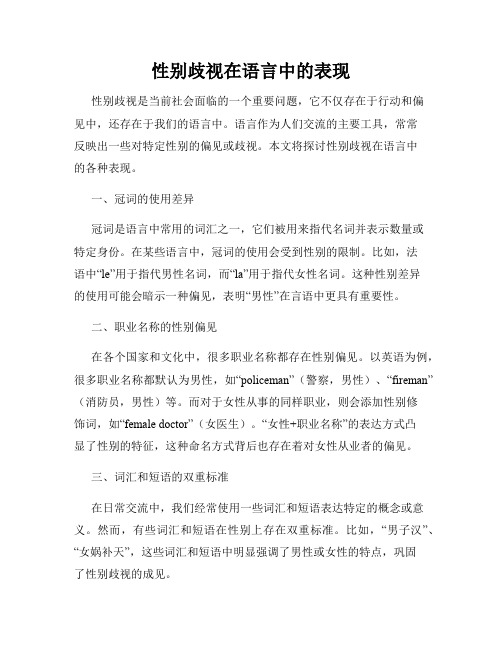
性别歧视在语言中的表现性别歧视是当前社会面临的一个重要问题,它不仅存在于行动和偏见中,还存在于我们的语言中。
语言作为人们交流的主要工具,常常反映出一些对特定性别的偏见或歧视。
本文将探讨性别歧视在语言中的各种表现。
一、冠词的使用差异冠词是语言中常用的词汇之一,它们被用来指代名词并表示数量或特定身份。
在某些语言中,冠词的使用会受到性别的限制。
比如,法语中“le”用于指代男性名词,而“la”用于指代女性名词。
这种性别差异的使用可能会暗示一种偏见,表明“男性”在言语中更具有重要性。
二、职业名称的性别偏见在各个国家和文化中,很多职业名称都存在性别偏见。
以英语为例,很多职业名称都默认为男性,如“policeman”(警察,男性)、“fireman”(消防员,男性)等。
而对于女性从事的同样职业,则会添加性别修饰词,如“female doctor”(女医生)。
“女性+职业名称”的表达方式凸显了性别的特征,这种命名方式背后也存在着对女性从业者的偏见。
三、词汇和短语的双重标准在日常交流中,我们经常使用一些词汇和短语表达特定的概念或意义。
然而,有些词汇和短语在性别上存在双重标准。
比如,“男子汉”、“女娲补天”,这些词汇和短语中明显强调了男性或女性的特点,巩固了性别歧视的成见。
四、对女性评价的贬低和侮辱性别歧视在语言中另一种常见表现是对女性的评价存在贬低和侮辱。
很多语言中,对女性的称呼常常伴随着某种负面意义,如“淑女”(含有保守和过时的含义)和“妇女”(强调关注于私人生活)。
这些词汇的使用带有一种偏见,传递出对女性能力和地位的低估。
五、语言中的性别刻板印象语言中的性别刻板印象是一种对男性和女性的常规描述,它们被认为是一种正常和可接受的行为特征。
典型的例子是将男性描述为“果断”、“强壮”和“聪明”,将女性描述为“温柔”、“美丽”和“敏感”。
这种性别刻板印象的存在使得性别歧视在语言中得以延续。
六、歧视性语言对个体的影响性别歧视的语言不仅仅是一种表达方式,也会对个体产生负面影响。
社会语言中的性别歧视
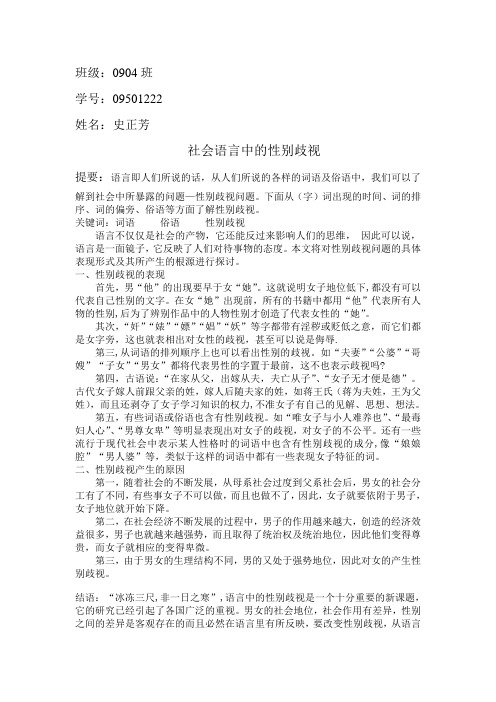
班级:0904班学号:09501222姓名:史正芳社会语言中的性别歧视提要:语言即人们所说的话,从人们所说的各样的词语及俗语中,我们可以了解到社会中所暴露的问题—性别歧视问题。
下面从(字)词出现的时间、词的排序、词的偏旁、俗语等方面了解性别歧视。
关键词:词语俗语性别歧视语言不仅仅是社会的产物,它还能反过来影响人们的思维,因此可以说,语言是一面镜子,它反映了人们对待事物的态度。
本文将对性别歧视问题的具体表现形式及其所产生的根源进行探讨。
一、性别歧视的表现首先,男“他”的出现要早于女“她”。
这就说明女子地位低下,都没有可以代表自己性别的文字。
在女“她”出现前,所有的书籍中都用“他”代表所有人物的性别,后为了辨别作品中的人物性别才创造了代表女性的“她”。
其次,“奸”“婊”“嫖”“娼”“妖”等字都带有淫秽或贬低之意,而它们都是女字旁,这也就表相出对女性的歧视,甚至可以说是侮辱.第三,从词语的排列顺序上也可以看出性别的歧视。
如“夫妻”“公婆”“哥嫂”“子女”“男女”都将代表男性的字置于最前,这不也表示歧视吗?第四,古语说:“在家从父,出嫁从夫,夫亡从子”、“女子无才便是德”。
古代女子嫁人前跟父亲的姓,嫁人后随夫家的姓,如蒋王氏(蒋为夫姓,王为父姓),而且还剥夺了女子学习知识的权力,不准女子有自己的见解、思想、想法。
第五,有些词语或俗语也含有性别歧视。
如“唯女子与小人难养也”、“最毒妇人心”、“男尊女卑”等明显表现出对女子的歧视,对女子的不公平。
还有一些流行于现代社会中表示某人性格时的词语中也含有性别歧视的成分,像“娘娘腔”“男人婆”等,类似于这样的词语中都有一些表现女子特征的词。
二、性别歧视产生的原因第一,随着社会的不断发展,从母系社会过度到父系社会后,男女的社会分工有了不同,有些事女子不可以做,而且也做不了,因此,女子就要依附于男子,女子地位就开始下降。
第二,在社会经济不断发展的过程中,男子的作用越来越大,创造的经济效益很多,男子也就越来越强势,而且取得了统治权及统治地位,因此他们变得尊贵,而女子就相应的变得卑微。
谈语言中的性别歧视-2019年精选文档

谈语言中的性别歧视Sapir- Whorf 假说认为,语言不仅仅是社会的产物,它还能反过来影响人们的思维和精神的构建。
因此,我们可以说,语言是一面镜子,它反映了人们对待事物的态度。
语言本身并没有性别歧视,可是并不是说社会中的性别歧视对语言没有影响。
社会学家指出:语言的结构、词汇及用法与操该语言的性别角色之间存在一定的联系。
然而,人们对于男女在语言方面的特点和差异的研究起步却很晚。
直到20世纪初,语言和性别问题才引起学者们的关注。
研究语言中的性别歧视有助于帮助我们了解社会和文化现象。
本文将对语言中的性别歧视所产生的根源、性别歧视问题的具体表现形式以及解决这一问题的对策进行探讨。
一、语言性别歧视的主要原因1.意识形态的影响。
神话与宗教都是文化的一种形式,女性在神话中的形象可以帮助我们语言中的性别歧视现象。
在世界各国神话中,男性被称为“物种之范”,而女性是作为附属于男性而存在的。
圣经中的上帝造人说,就是一个典型的例子:女人只是男人脊梁的一根肋骨。
亚里斯多德在《动物的起源》中认为:女人是残缺不全的男人。
汉文化更是如此。
孔子就把女人和小人归为一类。
而神话、宗教和汉文化的儒家思想都在历史上曾经一度统治过人的思想意识。
2.社会化偏见的影响。
在西方社会,妇女处于从属地位,而男性则是大权在握、身居要职。
如:已婚女子要改随丈夫的姓成为Mrs sb,未婚女性可以称为Miss, 而对于男性则没有这么多的限制,一个Mr 就全部概括了各种身份的男性。
在Mr Smith married off all her daughters中,marry off 很容易就让人想起auction off (拍卖掉), sell off(廉价出售)。
这些都反映了语言对女性的歧视。
汉语中,也有类似的歧视性语言,如长舌妇、美女蛇、头发长见识短等。
二、语言性别歧视的主要表现1.用于女人的词和表达方式通常是有标记的,即把女性视为男性的附庸,这是以男性为规范的一种表现。
英语语言性别歧视现象及其文化内涵

英语语言性别歧视现象及其文化内涵引言:语言是人类沟通的重要方式,它不仅仅是一种工具,更是人们思维、认知和文化的重要组成部分。
在语言的使用中存在着一些性别偏见和歧视观念,即人们在语言表达中对男性和女性的不公平对待。
这种性别歧视现象存在于许多语言中,包括英语。
本文将就英语语言中的性别歧视现象展开讨论,并探讨其背后的文化内涵。
一、英语语言中的性别歧视现象1. 使用委婉语言:英语中存在一些通过使用委婉语言来描述女性的习惯,这表现出一种道德或文化的偏见。
男性通常被称为“先生”(mister),而女性通常被称为“夫人”(madam)或“小姐”(miss)。
这种称谓的使用可能暗示女性的婚姻状况或者对她们的不同程度的尊重。
3. 谓词和形容词的使用:在英语中,谓词和形容词的使用也存在一些性别歧视。
通常认为,“男性”或“男人”是默认的普遍类别,而女性只是一个特殊的类别。
“他是医生”(he is a doctor)和“她是女医生”(she is a female doctor)之间的语言表达差异就显示了男性职业的普遍化和女性职业的特殊性。
二、英语语言性别歧视现象的文化内涵1. 社会角色分工和性别身份认同:英语语言的性别歧视现象反映了社会角色分工和性别身份认同的文化观念。
在许多文化中,男性被赋予了更多的权力和特权,被视为更加独立和有决策权的角色,而女性则更多地被赋予传统的照顾和家庭角色。
这种文化观念在语言中得到了体现,造成了对女性的歧视。
2. 男性为中心的性别意识形态:英语语言中的性别歧视现象还归因于男性为中心的性别意识形态。
这种意识形态认为男性在社会、政治和经济层面上具有更高的地位和权力,而女性则处于被支配和被动的地位。
男性的词汇和语法更容易成为普遍及中性词汇和语法。
3. 文化传统和历史背景:英语语言的性别歧视也与文化传统和历史背景有关。
在过去的几个世纪中,男性在社会生活中扮演着重要角色,而女性则被限制在家庭和私人生活中。
试述英语语言中的性别歧视现象

试述英语语言中的性别歧视现象1. 引言1.1 性别歧视的定义性别歧视是指基于性别或性别认同而产生的不公平对待或偏见。
这种不平等对待通常是由社会、文化或制度性因素造成的,导致对特定性别的人或群体进行歧视、排斥或限制他们的权利和机会。
性别歧视不仅限制了个人的发展和自由,也损害了整个社会的平等和公正。
在英语语言中,性别歧视也是普遍存在的现象。
这种现象体现在英语词汇、语法结构和语言习惯中。
一些特定的职业名称在英语中被默认为男性或女性,导致了对不同性别从事特定职业的偏见。
一些动词和形容词也存在着明显的性别偏见,如将男性与积极、有力或有能力联系在一起,而将女性与消极、软弱或无能联系在一起。
性别歧视在英语语言中的存在不仅影响了个体的自我认同和社会地位,也对整个社会的性别平等和公正构成了挑战。
我们需要更加关注和认识英语语言中的性别歧视问题,并采取积极的措施来消除这种现象,促进性别平等和社会公正。
1.2 英语语言中的性别歧视Gender discrimination in the English language is a pervasive issue that reflects and perpetuates societal gender biases. From the way we address individuals to the words we use to describegender roles, language plays a powerful role in reinforcing stereotypes and inequalities between men and women.2. 正文2.1 语言中的性别偏见语言中的性别偏见是指对不同性别的人在语言使用中存在偏向或偏见。
这种偏见可能体现在词汇选择、句法结构、语气和声调等方面。
在英语语言中,常见的性别偏见表现包括对男性视为默认或普遍代表,而女性则被视为特例或次要代表。
试论英语语言中的性别歧视

试论英语语言中的性别歧视一、性别歧视产生的原因(一)历史原因历史上的性别歧视由来已久。
在男性言语中,居主导地位的是权利意识,他们在话语运用过程中,意图实施其自认为应有的权利去实现对别人的控制;而女性话语则是平等的,言语的运用意在表明对所谈到的人或事物的兴趣、态度、关注等等,对她们来说,语言是交流思想,保持友谊的手段。
(二)社会分工不同在西方,社会长期存在着男尊女卑的现象。
男性身材高大,精力充沛,似乎他们更适合从事与生产有关的劳动在社会中占主导地位。
女性身材较小,比较文静、温柔,似乎适宜从事与人的再生产有关的劳动,所以女性处于从属地位。
这样,男性在经济上就占了主导地位,垄断了经济、政治、法律等公共领域;女性则处于附属地位,这一社会特征反映在语言上,就表现为英语性别歧视语言的大量存在。
(三)宗教思想在西方国家的文明发展中,基督教是西方文化的基石。
基督教教义以男性为主体,处处充斥着对女性的歧视。
在《圣经》中,上帝创造的第一个人类是男性,为了不让他感到孤单寂寞,上帝从男人身上取下一根肋骨,创造了一个女性去帮助和陪伴他。
所以,女性往往被视为男性的附属品,只能处于从属的地位。
二、英语语言中性别歧视的表现(一)词和构词上的性别歧视在英语的词汇和构词方面存在着语言的性别歧视。
例如man的使用范围相当广,它不仅可以表示男性,而且可以泛指人。
用man来泛指所有的人,明显是把男性放在中心地位,把女性融化在男性世界之中。
而man的对应词woman,专指妇女,不能表示人类,如若用woman来指男性,则带有贬义,例如:Li Ming is an old woman.李明是一个婆婆妈妈的人。
在构词上,也能看到对女性的歧视,例如:女性(female)就是由男性(male)派生而来的。
男性词总是无标记的,相反女性词汇是有标记的,女性词往往以男性名词为词根,加上相对固定的后缀而构成,以阴性后缀“-ess”为例,常见的有:author和authoress。
语言中的性别歧视
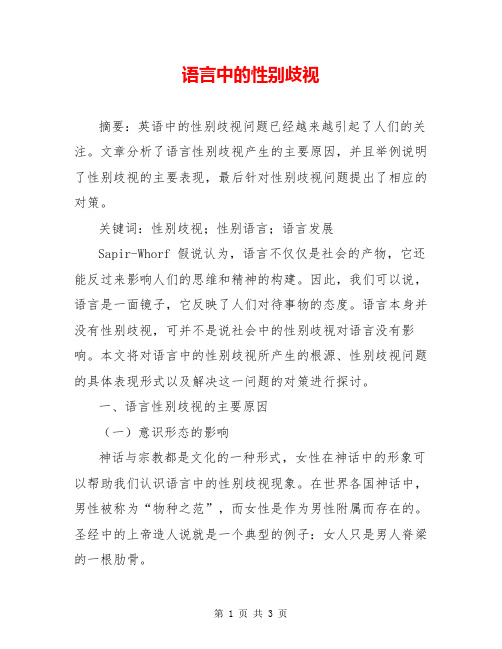
语言中的性别歧视摘要:英语中的性别歧视问题已经越来越引起了人们的关注。
文章分析了语言性别歧视产生的主要原因,并且举例说明了性别歧视的主要表现,最后针对性别歧视问题提出了相应的对策。
关键词:性别歧视;性别语言;语言发展Sapir-Whorf 假说认为,语言不仅仅是社会的产物,它还能反过来影响人们的思维和精神的构建。
因此,我们可以说,语言是一面镜子,它反映了人们对待事物的态度。
语言本身并没有性别歧视,可并不是说社会中的性别歧视对语言没有影响。
本文将对语言中的性别歧视所产生的根源、性别歧视问题的具体表现形式以及解决这一问题的对策进行探讨。
一、语言性别歧视的主要原因(一)意识形态的影响神话与宗教都是文化的一种形式,女性在神话中的形象可以帮助我们认识语言中的性别歧视现象。
在世界各国神话中,男性被称为“物种之范”,而女性是作为男性附属而存在的。
圣经中的上帝造人说就是一个典型的例子:女人只是男人脊梁的一根肋骨。
(二)社会化偏见的影响在西方社会,妇女处于从属地位,而男性则是大权在握、身居要职。
如已婚女子要改随丈夫的姓成为Mrs sb,未婚女性可以称为Miss, 而对于男性则没有这么多的限制,一个Mr 就全部概括了各种身份的男性。
汉语中,也有类似的歧视性语言,如长舌妇、美女蛇、头发长见识短等。
二、语言性别歧视的主要表现1.用于女人的词和表达方式通常是有标记的,即把女性视为男性的附庸,这是以男性为规范的一种表现。
英语中有:Prince/princess;actor/actress;host/hostess;heir/heiress;hero/heroine;usher/usherette等等。
汉文化中也有类似的现象:如旧中国时代,女人结婚后随夫姓,张氏、李氏等。
2.在表示男女性别的对应词或词组中,表示阴性的多具有贬义和轻蔑的色彩,很多和性欲有关。
如king(国王)——queen(王后、女王、雌猫);master(主人)——mistress(主妇、情妇);sir(先生)——madam(女士、夫人、鸨母);a public man(担任公职的人)——a public woman(娼妓); the play the man(显示出男子气概)——the play the woman(表示出女人的态度——哭泣和害怕等); bachelor(未婚男人,暗示自由,听上去有快乐和冒险的意味)——spinster (老处女,可表示年老、孤独、无聊、脾气怪异)。
- 1、下载文档前请自行甄别文档内容的完整性,平台不提供额外的编辑、内容补充、找答案等附加服务。
- 2、"仅部分预览"的文档,不可在线预览部分如存在完整性等问题,可反馈申请退款(可完整预览的文档不适用该条件!)。
- 3、如文档侵犯您的权益,请联系客服反馈,我们会尽快为您处理(人工客服工作时间:9:00-18:30)。
An analysis of sexism in English and its causes【Abstract】There are discriminations based on gender in English. There are different forms of expressions and they have its own origin in culture. This thesis is aim to analysis the sexism phenomenon and its causes.【Key words】sexism phenomenon; English; causesWe all know language is a system of arbitrary vocal symbols used for human communication. It is a big wealth created by human. Language is a carrier of culture, and a tool of thinking and communicating for human. It just likes a mirror of society, which reflects social culture, customs and folkways, humanism, and cultural consciousness and so on. In the long history, there was a big difference between male and female in social position. It reflects in many different sides included language. As the background that the word is dominated by male, the language users in using language, especially in vocabulary, create many words which belittle, despise and insult female. That is called sexist language. This thesis will try to analysis the sexism phenomenon and its causes.At first, we must know what sexism is. According to Webster Ninth New Collegiate Dictionary, the definition of sexism is that prejudice or discrimination based on sex: especially, discrimination against women. One explanation of sexism in American traditional dictionary is that the bias of a sort of gender members to other gender members. In language habit, sexism usually refers to the discrimination against women. Well then, how does English language discriminate female?English is a more masculine language, so there are many words against female. I will analysis it in vocabulary and syntax as following.①At the view of vocabulary, it is mainly in word-building and vocabulary meaning.⑴In the aspect of word-building, there are many words based on “man”. Such as: the meaning of the whole people is”mankind”; the meaning of ancestor is“forefather”; and some professional or title, policeman; postman; businessman; chairman and so on. Showing the nationalities, like Englishman; Dutchman; Frenchman etc. So we can say, female implicated is the accessory of male.⑵In semantics, there are many words specialized in referring male or female. The former have commendatory trend, but the latter usually have derogatory sense and deteriorative trend. Some words referring to female, firstly are commendatory words, but afterward slowly have derogatory senses. Such as gentleman and lady originally are a group of homologous words, but in modern English, the connotation of lady has become the counterpart of man. In Britain, we call female salespeople saleslady but we don’t call male salesman sales gentleman. Thus it can be seen lady and gentlemen have no opposite relationship of language in use. When gentleman has also kept dignity and sanctity, lady has become common woman. Boy and girl are not homologous words anymore, boy can not be used on chap beyond 20 years old, but girl can be used on woman beyond 20 years old. That is to say, people are inclined to call female by childish voice. According to textual research of language, in ancient indo-language, moon originally is masculine, while sun is negative. Later for the emergence of patriarchal clan, the genders of them were overturned. This is obviously related to the transference of right. Because people often associate sun, daylight with strength and luminosity, while moon and night are easy to make people think of the flabbiness and darkness. Like”bachelor”, which means the single man enjoys his single life, but like “spinster”, which means those old and virgin without charming. “Sir” and “madam” are both a respectful form of address, but “madam” can also be referred to a woman running a brothel. “Sir”doesn’t. The compound word “callboy” and “call girl” also are classified into this type. The former refers to the waiter in hotel or the person who calls the player ready to stage in theatre; the latter means the prostitute summoned by phone. These words have manifested the discrimination of language towards female from the angle of word matching.Besides “loose”refers to a man who is carefree and content, but to woman, it means the woman is dissolute. To man, “easy”means the man is amiable and get along with well, but it can also be indentified as a fickle and lascivious woman.“Cold” means the man is steady and calm, but to woman, it means the woman has a frigid disposition. And some other pairs of words also can reflect it, for example: “governor”——the chief leader; “governess”——house maid; “mister”——sir, “mistress”——the woman who seduces a married man. “King”——the chief leader of the country. “Queen”——a gay.The sexism in English vocabulary is not only shows this aspect, but also shows some food and animal name referred to woman. Actually, those words are not derogatory terms originally, but those words have the meaning of woman as the man’s pet or accessory to delight in. For example, “dumpling”——short and fat woman; “bunny”——sexy woman; “vixen”——fierce woman; “bitch”——shrew and so on. Woman as exception also shows the concept of male criterion. People usually in their minds regard reputable person as male, once a reputable woman will be treated as an exception, which will be wantonly aired by mass media. Whenever and wherever once refer to a famous woman, people are used to add female, and woman and other words before their names to show their sexes. But this situation doe sn’t exist in male.For example: western people are costumed to think “professor”“doctor”“lawyer”“surgeon”are all male words. If you want to express female doctor or female lawyer, you should add the prefix “lady” or “woman”.It is a long time that man always indentified woman’s female feature and social role, position with theirs appearance and social relationship, not with their ability and quality. It shows in language that people are used to use those words, like “beautiful; slender; plump” and so on. It seems like woman’s value only in their appearance. For example: a poster about picnic in one of American university says “Good Food! Delicious Women”In western country, once a girl married, she has to change her last name into her husband. It almost like the girl is belonged to someone. The serious and holly wedding ceremony in church, the clergyman claimed “I now pronounce you man and wife.” No matter man married or unmarried, they still are called man, but to woman, when they are unmarried, they are called woman, when they are married, they arecalled wife, a man’s spouse, leaded by their husband, giving birth to and raising. When the marriage is broken up, they have different names. The man is bachelor, but the woman is so-called a divorcee. The two words have totally different meanings. One is positive, another is negative. A divorcee just cannot bear to think of the past.In the past, women’s social status is so low that their languages are often confined. The most obvious exemplification is th at if women use some scrannel “expletives”, such as “damn it, shit etc” would be considered as terrible inelegant. People hope that they use some more elegant words as “oh dear or fudge.” The difference is that the men can use all kinds of words to express their strong feelings arbitrarily without blame, while the women have no this privilege. “Mr.” once has made many men feel pride. When people call “Mr. ---” the martial status of him is unknowable. But when it is turns to women, people usually clarify the women’s martial status: the female unmarried is called “Miss. ---”, otherwise called “Mrs. --- (husband’s name)”. In British and American, women in soiree often are asked by others with a question “what does your Husband do?” but there is never one who as ks a man what does his wife do. If there is some one really who asks such question, the man asked would be surprised to say: “she’s my wife, that’s what she does”. G. Lakoff talked about the similar situation in his book “Language and Woman’s Place”. When the New York Times reported the female candidate of the Supreme Court, it described her appearance, her husband’s job, called candid ate of mayor of San Francisco as Mrs. Feinstein. But to male rival, it didn't describe his appearance and what did his wife do, and directly called the male candidate Alioto, not Mr. Alioto( Chen Song Cen,1985:128).There is a vivid example. The first lady, Hillary in the U.S.A. still suffered the sexism, because of surname. Her family name is “”. And she don’t accept the change of surname, so in 1979 his husband Clinton elected the mayor of ( ), it brings a lot of troubles. Because the conservative people in ( ), they can’t stand a new people who doesn’t adhere to the traditional. For his husband’s political prospect, there is no choice but to change her surname. When a woman use her husband’s family name as hers, it shows that she give up her independent cultural symbol. Actually, it alsoshows that female lost their independence in a part of cultural.②from the aspect of syntax, the sexism in English language mainly reflects the use of general personal pronoun, and some phrases or the order of fixed words.Firstly, the third person’s singular in English, if the gender is different, they always use “he”, “him”, “his”. Of course, when repeating a noun, they still use “he”, “him”“his”. They get rid of female.For example: Everyone should do what he thinks well.If a person breaks the law, he will be punished.Somebody has lost his key.Secondly, when there are two words, one is female, another is male. They must put the male word firstly, not the female wordFor example: Men and women, husband and wife, boys and girls, father and mother, brother and sister etc. The phrase like “ladies and gentlemen” is really seldom seen. English language’s discriminations towards women also lie in some proverbs and idioms. Women always are described as loving chatting and stirring up trouble. For example: A woman’s tongue wags like a lamb’s tail. (England)Foxes are all tail and women are all tongue.The North Sea will sooner be found wanting in water than a woman at a loss for a word.A fickle thing and changeful is woman always.2 We have talked about so many phenomena, so we have to discuss the reasons about the sexism. In nature, sexism in language reflects sexism in society. The two are closely related. Social connotations of sexism in English tell the relationship between phenomena of sexism in language and essence of sexism in society.In western countries, the Christianity is very important to them. It is inevitable that the Christianity do has a big effect to people. In the Bible, man create the world, the woman is just a rib of man. This provides the founding theory. So in western countries, the main stream of cultural always adheres to the thoughts that man is superior, and woman is inferior. Women have a low situation in society. Man considers themselves as shelter. And woman just lives in their wings. Man includes all human beings, andhe stands for the male and the female. History is made up of man’s achievement and heroic story. Thanks to that, the words relating to woman mostly are discrimination, ridicule and deprecation. The American vice president Spiro Agrew ever said that something to the effect that it is difficult to tame “oceans, fools, and women”in August 26th 1970, which is the American women liberation day.In English, the mostly reflection woman’s low situation are the dirty words. Because many people think that woman is equal to disaster, even someone thinks that the fall of man and expulsion from the Garden of Eden involves in woman. Because woman eats the forbidden fruit by the snake’s enticement, the god is furious. They scold woman, like cow, mare and so on.Stereotype is a cognitive manner and cognitive strategy of human beings, which is shows analogy procedure from specific to general. Tough it can help make things category, it often has the abuse of overgeneralization. When stereotype is related to moral belief, value system, and language culture, it is easy to make some subjective judge standard representing some hackneyed concept and discrimination manner (Pullman 1983; Berryman 1980). Social linguists is considered to this question what must be paid attention is that because of affection of patriarchies of thousands years, society has formed a bias to women’s ability, value and behavior, and finally formed a thought stereotype and cultural stereotype and entered into the value system of social members. There are so many examples to prove it. To the relationship between cultural stereotype and language behavior, firstly we find that sexism in language has existed in many cultures, which reflects a popular language rule. And secondly we find that in mostly cases, this cultural stereotype incarnates the phenomena of social inequalities caused by ascendancy culture. Thus, sexism in language is not only a question of language in use, but reflection of rooted social stereotype, and the results of the patriarchal view or male chauvinism, and also the direct embodiments of women’s long suffering the unfair treatment in politics, society, education, economy, and culture etc. Language of course has a traditional part, but the use of language in specific social context inevitably has the different ideological trend and value judgment. It is same to talk about the questions of sexism in language. Condition isjust same as the saying of famous sociolinguist Sally McConnell ( Ginet 1983: 388) “The sexual politics of di scourse affects WHO can mean WHAT ,and WHOSE meanings get established as community currency”.The research of discourse analysis tells us that sometimes different communities can reflect a certain influence of stereotype to other communities’ discourse beh aviors. In Anglo-American culture, affected by the thought stereotype and the cultural stereotype people often thinks women’s discourse behaviors as trivial, gossipy, empty and meaningless. Sociolinguists investigate and find that in real language communication, male have more chance to turn talking, interrupt, and floor the others comparing with female. As social member we know the individual’s language behavior is restricted by many factors such as spatial, temporal, cultural, informative, and idiosyncratic one. To more important, there is a research that testifies that in Britain and American society, the stereotypes of male chauvinism mainly have come into being in growing period of young ones through the progress of socialization (Shelley Phillips 1983). Through the research of two thousands, Australian pupils’ views to opposite sex, we find that even in the procedure of metal developing of teens, conventional idea of sexism has formed. Female young ones’ descriptions to their male buddies almost have no derogative colors; but almost 50 percents of male young ones see female’s characteristics as undesirable. According to sociology “labeling theory”, the contents of cultural stereotype are usually some negative views of society to puny community as minority and females (Bainbridge 1994: 4025). Briefly speaking, male chauvinism and patriarchy make sexism in society, and they are reflected in the English language.As we all know, man and woman have their own characteristics. But as a group, there are mainly group: man and woman. When they were born, they have been given different social roles and social situations. The society indentifies man as their ability, achievement, career, title and talent. People hope man can be independent, but to woman, they should be soft, gentle and agreeable. Because that, when female leave school and begin to find their own means of livelihood, the common customs’ attitude towards them is that “men have careers, women have jobs.” Actually, the unspokenwords are only man can realize their ambition and have an infinitely bright future. Comparing with man, woman just can find a simple job to feed on herself. That is one of reasons that man is more than woman in important and political careers all over the world.To make a long story short, the sexism in language is a very important new question for discussion, which has been attached importance by a lot of countries in the world. With the high-speed development of society and scientific technology, our research on sexism in the English language will come to a new stage. The sexism in English language on the whole is a social problem, which is the thought of human beings in their minds discriminating female and reflecting it in language. As we all know language is relatively steady, if we want to eliminate the sexism in the English language, firstly we must eradicate the concept of sexism existing in society to make people realize the point and make the real equality of male and female and give the female the equal recognition and respect. Though the changes in social concept to make the changes in language naturally, finally realize that whether in society or language, sexism is just a history of past. In this paper I greatly agrees with a passage of saying of Rosalie Mag gio: “It is also necessary to acknowledge that there can be no solutions to the problems of sexism in society on the level of language alone .Reference documents:1 Bonvllain. N. women and men: Cultural Construction of Gender [M].New Jersey: Prentice Hall. Lnc. 1998.2 Christie C. Gender and language [M]. Edinburgh University Press. 20003 Journal of Jiangnan University(Education Sciences) vol.28 No.1 Mar.2008 江南大学学报(教育科学版)第28卷第一期2008年3月4 Science & Technology Information vol.29 2009 科技信息报2009年第29期5 Berryman, Cynthian L. Attitudes toward male and female sex-appropriate andsex-inappropriate language. In Cynthia L. Berryman &Virginia A. Eman (Ed), Communication, language and sex, 195-216. Rowslay, Mass: Newbury House, 1980.。
